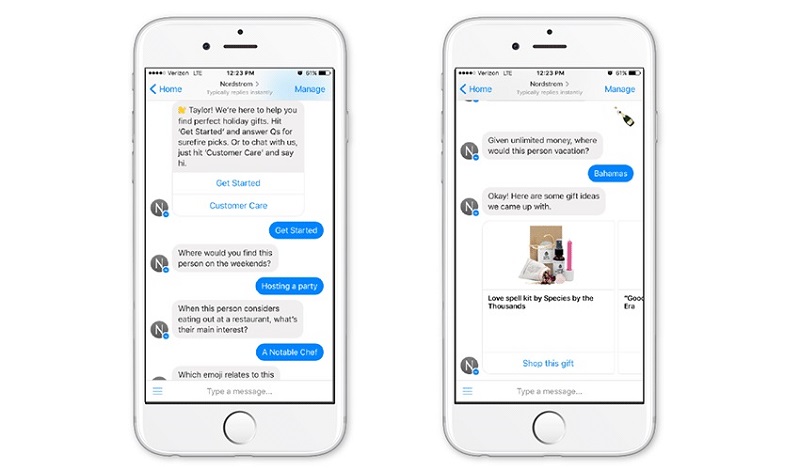With sites like Facebook and Kik opening their platforms to automated messaging for companies, chatbots have really exploded in popularity. Facebook went from zero chatbots in February 2016 to 18,000 by July of the same year. Kik had approximately 300,000,000 registered users, and those users exchanged 350,000,000 automated messages with the platform in the first seven months of its chatbot.
You’ve probably seen chatbots in action. They are on all sorts of websites, from major retail chains to mobile phone service providers and many other types of sites and apps.
At first, you might think you’re talking to a real person. Usually, a popup appears with a picture of an agent, along with a name. The “agent” asks something like, “May I help you with anything?” Or, “Do you have any questions?”
Chatbots use artificial intelligence that are often use to answer many questions a user might have, and in the event that the bot is unable to help the user, it will usually ask the user to call, email, or fill out a support form, or perhaps to check a F.A.Q. page.
RECOMMENDED: How To Optimize Your Facebook Ad Design In 4 Easy Steps
Chatbots are quite advanced, and many of them can almost manage to fool users into thinking they were speaking to a real person. This is beneficial, because it allows companies to lower their overhead by using chatbots to replace customer service agents in many circumstances, and only when the chatbot is unsuccessful in helping the customer, then a real agent steps in.
Chatbots have a few drawbacks, but they also have many benefits. In this post, you’re going to learn more about how chatbots can be used for marketing, and whether or not chatbots are a good fit for your business.
So let’s get started.
Advantages of Chatbots
Chatbots are very useful for a lot of different applications—from simple user contact, to answering questions, and even helping the sales process along.
One of the biggest benefits of using Chatbots is that you can have fewer actual employees, because chatbots can take care of a lot of issues that might take up time from paid employees. This frees up paid employees for more important tasks, and allows them to have more time to help customers with major issues.
This benefits customers, too, because they can get answers to questions, and help with problems much faster than they might, if they ended up contacting customer service through traditional means.
Bots can also provide you extremely valuable information about your customers, if you log those conversations and analyze them, because you can see the types of questions they were asking. Never overlook those logs as a way to find out more about them.
RECOMMENDED: The Top 2 Facebook Ads Strategies To Make People Aware Of Your Business
Disadvantages of Chatbots
Of course, chatbots have a few drawbacks, too. No technology is perfect, and bots are no exception.
The biggest drawback is that artificial intelligence, no matter how advanced it may be, is not yet at the level that can replace actual humans. This inevitably leads to failure to help customers sometimes, which may end up frustrating the user enough that they leave your site. This is rare, but it can happen, so you must make sure your chatbot can direct customers to live help when needed.
Many bots are poorly programmed because they have been rushed to market to take advantage of the surge in chatbot use, so you must be on the lookout for this, as well. The cheapest solution isn’t always the best, so it’s vital that you test your chatbot thoroughly to make sure there are no problems with it that could end up frustrating your customers.
Are Chatbots Right For You?
Chatbots aren’t right for every business. If you find that you don’t have a lot of contact with customers normally, you may not need a chatbot. But, on the other hand, if you do have a lot of contact with customers, or if you find you have a lot of shopping cart abandonment or your customers tend to ask a lot of questions or need additional help, a chatbot just might be perfect for your needs.
RECOMMENDED: How To Make The Most Of Your Facebook Custom And Lookalike Audiences
Here are some situations where a chatbot might work for your business:
- Your customer service agents are overwhelmed. If you find that your agents are overwhelmed by the volume of help requests you get daily, especially if they are simple requests that could easily be taken care of by a bot, it makes perfect sense for you to use one.
- You have a high rate of shopping cart abandonment. If you find that a lot of people are abandoning their shopping carts or leaving your site without converting into email subscribers or buyers, a chatbot might help by asking the customer what went wrong when they try to leave your site, and then guide them through the process, so they can complete the conversion.
- Customers keep asking the same questions over and over. Let’s face it, customers rarely read F.A.Q. pages. Sometimes you may wonder, “Why even bother having a F.A.Q. page? It seems like nobody reads them!” And that’s true. But chatbots are a great way to get more people to find out the answers to simple questions without wasting your or your agents’ time. You can program common questions into your bot and let it answer those questions.
- Your business is oriented toward service. If you’re in an industry that is notoriously service-centric, such as the travel industry, for example, chatbots can go a long way toward helping customers get assistance while alleviating some of the initial work that agents might otherwise have to deal with.
These are just a few examples, but hopefully ,you’re beginning to get an idea of whether or not a bot might be a good fit for your business.
